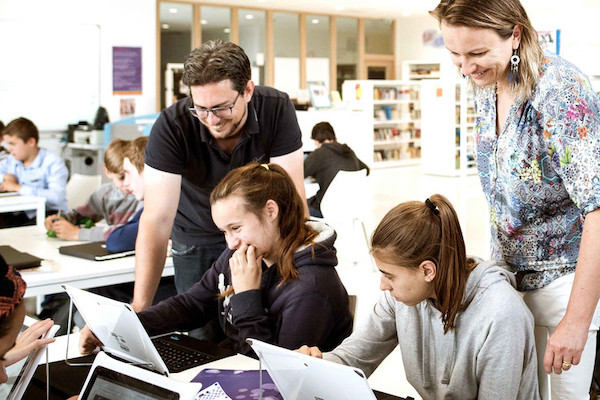The reform of the baccalaureate has introduced a new speciality course: " digital and computer sciences".
The reform abolished the former literary (L), economic and social (ES) and scientific (S) series of the general track. Students entering the première générale (at the start of the 2019 school year) were required to choose three specialty courses from among the 19 offered (including 7 artistic courses). These three compulsory specialties are in addition to the core subjects and the two compulsory modern languages. The three specialties in Première will be reduced to two in Terminale, with an hourly volume of three times four hours per week in Première and two times six hours per week in Terminale.
8.1% of students chose "Digital and Computer Science" (DCS)
At the national level, at the start of the 2019 school year, 31,502 students in 1ère (out of 386,600) chose to study "digital and computer science" (NSI). This course ranks 8th among the most chosen courses.
This eighth place ranking is all the more noteworthy given that only 750 public high schools and 250 private high schools offer this type of education, due to the lack of teachers trained in this discipline. The new CAPES will open in 2020.
8.1% of the students in the first year of general education chose "education": 2.6% of girls and 15.2% of boys.
Référence :
digital and computer sciences
Six times more boys than girls ...digital and computer sciences
The gender bias is more pronounced for "(NSI) than for mathematics, chosen by 61% of girls and 78% of boys, or physics-chemistry, chosen by 57% of boys and 39% of girls.) While 11% of boys and 2% of girls chose Engineering Sciences, Life and Earth Sciences (LES) was chosen by 45% of girls and 41% of boys.
digital and computer sciences
In general, girls remain more clearly oriented towards the language specialties, the teaching of " " and (less strongly) towards the teaching of history-geography-geopolitics and SES. While 69% of students in 1ère Générale chose mathematics overall, 76% of students from very privileged social backgrounds did so, whereas 62% of students from disadvantaged social backgrounds took this subject. Similarly, students from disadvantaged social backgrounds chose physics and chemistry less often than those from advantaged social backgrounds.
humanities, literature and philosophy
NSI: more open to students from privileged social backgrounds than other science courses
From this point of view, the choice of "education" appears to be much less determined by social origin: it concerns 8.4% of students from privileged social backgrounds, 7.7% of students from average social backgrounds and 7.7% of students from disadvantaged social backgrounds.
digital and computer sciences
On the other hand, SES, history-geography, languages and humanities are chosen more by students from disadvantaged social backgrounds than on average. This is also the case for the arts.
The "Numerics and Computer Science" speciality course in the first year of the general stream
The specialization in digital and computer science in the final year of the general education cycle aims to provide students with the fundamentals of computer science in order to prepare them for further study in higher education, by training them in the practice of a scientific approach and by developing their appetite for research activities.
The objective of this course, which is not professionally oriented, is the appropriation of the concepts and methods that form the basis of computer science, in its scientific and technical dimensions. This teaching is based on the universality of four fundamental concepts and the variety of their interactions: To these concepts is added a transversal element: the interfaces that allow communication with humans, the collection of data and the control of systems.
- Data, which represent in a unified digital form very diverse information: texts, images, sounds, physical measurements, sums of money, etc. - The algorithms, which specify in an abstract and precise way the treatments to be carried out on the data from elementary operations.
- Languages, which allow abstract algorithms to be translated into textual or graphical programs so that they can be executed by machines.
- The machines and their operating systems, which allow to execute programs by chaining a large number of simple instructions, ensure the persistence of data by their storage and manage communications. We include connected objects and networks.
This teaching is an extension of the computer science lessons given in elementary school, in secondary school in mathematics and technology and, in secondary school, the common teaching of digital science and technology.
It is also based on the algorithms practiced in mathematics in the second year of high school.
It allows you to develop skills:
- analyze and model a problem in terms of information flow and processing;
- Break down a problem into sub-problems, recognize previously analyzed situations and reuse solutions;
- design algorithmic solutions;
- translate an algorithm into a programming language, specify interfaces and interactions, understand and reuse existing source code, develop program development and validation processes;
- mobilize the concepts and technologies useful to ensure the functions of acquisition, memorization, processing and dissemination of information;
- develop abstraction and generalization skills.
Référence :
A CAPES "digital and computer sciences" in 2020
The Minister of Education announced in January 2019 the creation of a Capes in computer science from 2020
The first session of the Capes "Numerics and Computer Science" will take place in 2020. The winners will be appointed as trainee teachers at the beginning of the school year in September 2020.
To be eligible for the external competition, candidates must meet the following diploma requirements:
- be enrolled in the first year of study (M1) for a master's degree,
- or meet the requirements to enroll in the final year of study for a master's degree,
- or be enrolled in the final year of studies (M2) for a Master's degree,
- or hold a master's degree or a title or diploma recognized as equivalent.
Référence :





